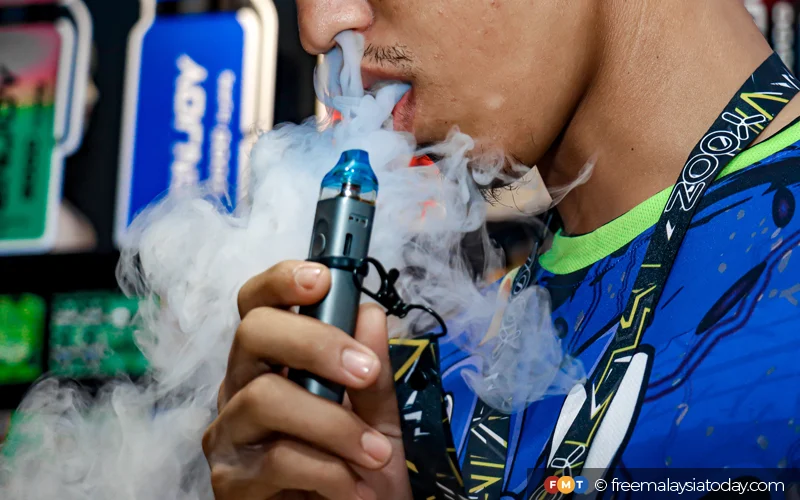
PETALING JAYA: On June 30, three NGOs filed a lawsuit against the government over a controversial decision by its health minister to declassify nicotine as a scheduled poison.
The Malaysian Council for Tobacco Control (MCTC), the Malaysian Green Lung Association and Voice of the Children all support the proposed Control of Smoking Products for Public Health Bill 2023 and its generational end game (GEG) policy.
They have brought the suit to force the government into reversing its decision.
FMT takes a closer look at the issue.
A controversial, ‘heavy-hearted’ decision
On March 31, health minister Zaliha Mustafa announced the ministry’s decision to remove liquid and gel nicotine from the list of poisons set out in the Poisons Act 1952, paving the way for the taxation of vape products.
Zaliha was subsequently reported as saying that she had signed off on the exemption order with a “heavy heart”. She said exempting nicotine was “not an ideal scenario” given that the Bill had not been passed.
First tabled by former health minister Khairy Jamaluddin in July last year, the Bill, which seeks to outlaw smoking for anyone born on or after Jan 1, 2007, was held up by resistance from some lawmakers over its contents. A parliamentary select committee (PSC) on health was asked to address those issues.
The Bill met with the same fate last month when it was referred back to the PSC for review. Bandar Kuching MP Dr Kelvin Yii, who chairs the PSC, said no timeline has been set for its second reading.
Reactions to exemption
Several children’s rights and anti-tobacco organisations, including the MCTC, criticised Zaliha immediately after the exemption was announced, accusing her of misusing her ministerial powers to overrule the Poisons Board set up under the Act, which had unanimously voted against the delisting.
The MCTC said declassification would result in the removal of regulations which prevent retailers from selling, marketing and promoting e-cigarettes and vape products to minors.
The Malaysian Medical Association (MMA) called on Prime Minister Anwar Ibrahim to reverse the exemption, arguing that it was necessary to protect public health, especially that of the younger generation. Its president Dr Muruga Raj Rajathurai said Putrajaya should have waited for the GEG bill to be passed before proceeding with the exemption.
An ‘irrational’ decision
The lawsuit names Zaliha and the Malaysian government as respondents. It seeks to quash the minister’s decision to remove liquid and gel nicotine from control under Act.
In the court filing, the applicants contend that the minister had acted “illegally, irrationally, and with procedural impropriety.”
“(Zaliha), in acting on the wishes of the finance ministry and disregarding the decision of the Poisons Board, acted ultra vires the Poisons Act by failing to apply and exercise her own independent judgment as is expected of a reasonable health minister that is responsible for health, rights and safety measures,” the NGOs said in a statement filed in support of the application.
The applicants further contend that the imposition of customs duties on nicotine was not a permissible or rational reason to remove the substance from the poisons list.
In effect, they claim, the exemption has made it legally permissible for vape products to contain any level of nicotine. As a result, vape pods containing 30mg per ml to 50mg per ml of nicotine can be found in the Malaysia market.
In contrast, countries that regulate vape, such as the United Kingdom, Australia and Indonesia, only permit a maximum of 20mg per ml to 30mg per ml of nicotine in vape products, the NGOs said.
They add that the minister’s decision contradicts Malaysia’s international commitments and goes against the ministry’s own objectives and warnings against nicotine-laced products.
Legal battle
The suit, which takes the form of an application for a judicial review of the minister’s decision, requires the applicants to first secure leave (or the permission) of the High Court to challenge the ministerial decision.
At the leave stage, the court’s function is to consider whether the case satisfies all legal and procedural elements that allow it to be subjected to judicial review, including that it is not a “frivolous” or “vexatious” case. The Attorney-General, in his capacity as the protector of public interest, participates in the inquiry.
The leave application is scheduled to be heard by Justice Wan Ahmad Farid Wan Ismail on July 26.
If leave is obtained, the suit will proceed to the second stage. This is where the minister and the government will be required to justify their decision.
Continue following FMT for developments. - FMT



No comments:
Post a Comment
Note: Only a member of this blog may post a comment.